Related Research Articles
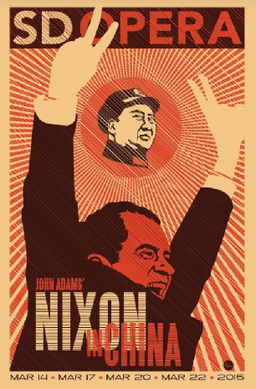
Nixon in China is an opera in three acts by John Adams with a libretto by Alice Goodman. Adams's first opera, it was inspired by U.S. president Richard Nixon's 1972 visit to the People's Republic of China. The work premiered at the Houston Grand Opera on October 22, 1987, in a production by Peter Sellars with choreography by Mark Morris. When Sellars approached Adams with the idea for the opera in 1983, Adams was initially reluctant, but eventually decided that the work could be a study in how myths come to be, and accepted the project. Goodman's libretto was the result of considerable research into Nixon's visit, though she disregarded most sources published after the 1972 trip.

Traditional Chinese opera, or Xiqu, is a form of musical theatre in China with roots going back to the early periods in China. It is an amalgamation of various art forms that existed in ancient China, and evolved gradually over more than a thousand years, reaching its mature form in the 13th century, during the Song dynasty (960–1279). Early forms of Chinese theater are simple, but over time various art forms such as music, song and dance, martial arts, acrobatics, costume and make-up art, as well as literary art forms were incorporated to form traditional Chinese opera. Performers had to practice for many years to gain an understanding of the roles. Exaggerated features and colors made it easier for the audience to identify the roles portrayed.
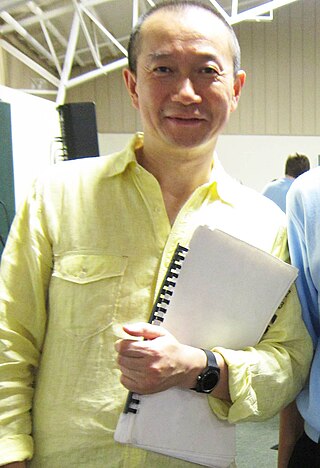
Tan Dun is a Chinese-born American composer and conductor. A leading figure of contemporary classical music, he draws from a variety of Western and Chinese influences, a dichotomy which has shaped much of his life and music. Having collaborated with leading orchestras around the world, Tan is the recipient of numerous awards, including a Grawemeyer Award for his opera Marco Polo (1996) and both an Academy Award and Grammy Award for his film score in Ang Lee's Crouching Tiger, Hidden Dragon (2000). His oeuvre as a whole includes operas, orchestral, vocal, chamber, solo and film scores, as well as genres that Tan terms "organic music" and "music ritual."

Peter Sellars is an American theatre director, noted for his unique contemporary stagings of classical and contemporary operas and plays. Sellars is a professor at the University of California, Los Angeles (UCLA), where he teaches Art as Social Action and Art as Moral Action. He is widely regarded as one of the key figures of theatre and opera of the last 50 years.
Joseph Celli is an American musician and composer specializing in contemporary and improvised music for oboe and English horn. In addition, he plays the Yamaha WX7 MIDI breath controller, as well as double reed instruments from several Asian cultures, including the Korean hojok and piri, and the Indian mukha vina.

Tang Xianzu, courtesy name Yireng (義仍), was a Chinese playwright of the Ming Dynasty.

The Peony Pavilion, also named The Return of Soul at the Peony Pavilion, is a romantic tragicomedy play written by dramatist Tang Xianzu in 1598. The plot was drawn from the short story Du Liniang Revives For Love and depicts a love story between Du Liniang and Liu Mengmei that overcomes all difficulties. Tang's play diverges from the short story in that it integrates elements of the Ming dynasty, despite being set in the Southern Song.
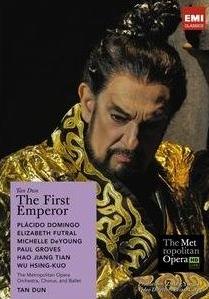
The First Emperor is an opera in two acts with music by Tan Dun and a libretto written in English by Tan Dun and Ha Jin. The opera received its world premiere at the Metropolitan Opera at Lincoln Center in New York City on 21 December 2006, conducted by the composer with Plácido Domingo in the title role. It was broadcast live to hundreds of cinemas around the world on 13 January 2007 as part of the Met Live in HD season. The following year, EMI released this movie broadcast on DVD. The opera was a co-production between the Metropolitan Opera and the Los Angeles Opera and was described to be the most elaborate Metropolitan Opera production since War and Peace.
Emi Wada was an Academy Award-winning theatrical, movie and ballet costume designer from Japan.
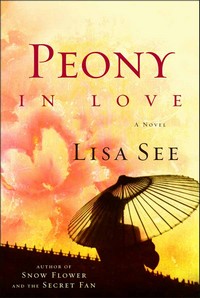
Peony in Love is the fifth of Lisa See's novels. Her previous novel, Snow Flower and the Secret Fan, and Peony in Love emphasize the difficulty 19th- and 17th-century Chinese women had in achieving freedom and identity in a society that was both male dominated and rigid in its gender expectations.
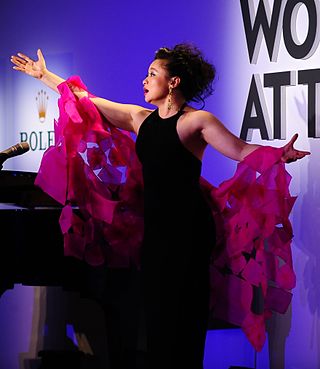
Ying Huang is a Chinese operatic soprano. She first came to international attention when she sang the title role in Frédéric Mitterrand's 1995 film Madame Butterfly and went on to an international career both in opera and on the concert stage.
Marco Polo is an opera by the Chinese-born composer Tan Dun set to an English libretto by Paul Griffiths. It premiered in Munich on 7 May 1996. Described variously as an "opera within an opera" and a "fantasia on an epic journey", the multi-layered storyline is loosely based on the journey of Marco Polo from Venice to China. In the opera, Marco Polo becomes two characters: Marco, who represents the real person and is sung by a mezzo-soprano, and Polo who represents his memory and is sung by a tenor. The work is scored for vocal soloists, a chorus of 20 and a large orchestra of both modern and medieval European instruments as well as instruments from the cultures that Marco Polo passed through on his journey, including sitar, pipa, sheng, tabla and Tibetan horns and bells. Marco Polo won the 1998 Grawemeyer Award for Music Composition.
Xu Ying is a Chinese librettist.

The Peach Blossom Fan is a musical play and historical drama in 44 scenes that was completed in 1699 by the early Qing dynasty playwright Kong Shangren after more than 10 years of effort.
The Jiangsu Performing Arts Group, or JPAG, is a theater company established in 2001 and based in Nanjing, Jiangsu, China. It is one of the largest performing arts groups in China and has won eighteen Plum Blossom Prizes and twenty-one Wen Hua Awards. It has also been named "National Key Enterprise for Cultural Export" six times. The group participates in the Chinese Cultural System Reformation.
Zhang Jiqing was a Kunqu artist.
Tea: A Mirror of Soul is a 2002 Chinese-language western-style opera by Tan Dun, to a libretto by the composer and Peking opera librettist Xu Ying. The opera was commissioned by Suntory Hall in Tokyo, Japan and was given its world premiere performance there in English. The United States premiere, also in English, was given on July 21, 2007 at the Santa Fe Opera in Santa Fe, New Mexico.
Chen Yuanlin is a Chinese electronic composer based in the United States. He is a guest lecturer at the Center for Electronic Music of China (CEMC) founded in 1993 by Professor Zhang Xiaofu at the Central Conservatory of Music in Beijing.
Tian Yuan Tan is a Singaporean scholar of Chinese literature. Since 2019, he has served as Shaw Professor of Chinese at the University of Oxford and a Professorial Fellow of University College. Prior to his appointment at Oxford, he was Professor of Chinese Studies at SOAS, University of London.

Lingguan is the stage name of a fictional Chinese opera actress from the Chinese novel Dream of the Red Chamber. She is one of the most strong-willed characters in the novel. Critics consider both Lingguan and Qingwen as doubles of Lin Daiyu.
References
- ↑ The Poetics of Difference and Displacement Page 134 Min Tian - 2008 "The main component of Part Two of Sellars's Peony Pavilion is Tan Dun's composition of a two-hour opera. Tan's music exemplifies the simultaneity, diversity, and heterogeneity of postmodern culture, which "has absolutely no cultural ...""
- ↑ The Rough Guide to Opera Matthew Boyden, Nick Kimberley, Joe Staines - 2002 "Few composers embrace the implications of a global musical culture as wholeheartedly as Tan Dun, born in China but ... The second, Peony Pavilion (1998), a collaboration with director Peter Sellars, tells an ancient Shanghai opera love story .."
- ↑ Tang Xianzu Mudan Ting introduction Page 30, translation by Cyril Birch 2002 "... hours to Chen Shi-Zheng's production and another hour to the making of it; Sony has released a CD, Bitter Love: A Song Cycle (based on the opera Peony Pavilion), that features Ying Huang singing portions of Tan Dun's score for Part Two."